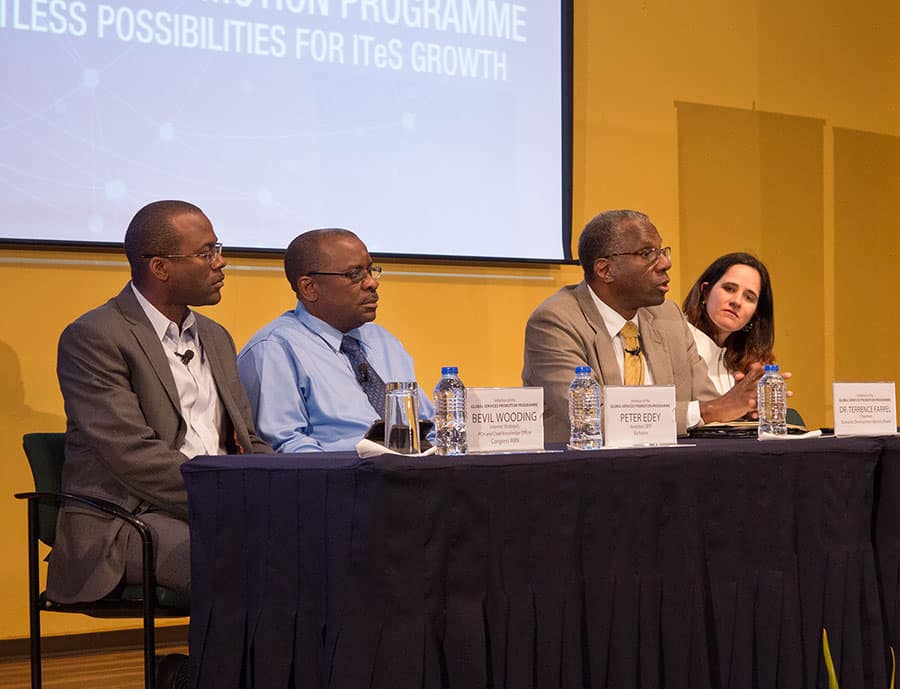
Above: At the Global Services Promotion launch, Internet strategist Bevil Wooding, Barbados project awardee Peter Edey, Dr Terrence Farrell and Carolina Gonzales-Velosa, Labour Market and Social Security Specialist, IADB respond to audience questions. Photo by Mark Lyndersay.
BitDepth#1077 for January 24, 2017
There were a lot of words spoken at the “initiation” of the Global Services Promotion Programme, a project of the Ministry of Planning and Development and the Inter-American Development Bank (IADB).
Most of those words were aspirational, seeking to spur the enthusiasm of both the audience present at the Yara Auditorium of the Arthur Lok Jack School for Business and the streamed video audience and the target audience for the development fund, set at $18 million.
Some of those words have already been reported, notably Dr Terrence Farrell’s warning that by 2030 T&T will cease to be a viable oil exporting economy and that the same fate awaits our natural gas export capacity by 2050.
What, he wondered, would the country look like then?
The other striking word came from the programme’s champion, Tracy Hackshaw, who framed his closing remarks around “hope.”
Hackshaw is absolutely on target with that sentiment. He is correctly placed in local ICT governance to visualise the potential for technology driven development of economic drivers, and he’s been around to witness the stuttering collapse of previous attempts to do just what the new Global Services Programme has been set up to do.
Former Planning Minister, Dr Bhoendratt Tewarie was praised by his successor in the role, Camille Robinson-Regis, for his pioneering efforts in laying the groundwork for the fund and setting T&T on the road to ICT enabled diversification.
Unfortunately, we have heard some of these words before from Dr Tewarie himself, who rather notoriously confused “innovation” with “new” continuously during his tenure in the Ministry and presided over significant spending on pilot projects and proofs of concept that have largely gone nowhere.
But to single out Dr Tewarie is to ignore the many successive administrations which have tried to wring short-term vote-winning tactics and attractive soundbites out of the long term strategic initiatives proposed by the career technocrats in the public service working in the ICT sector.
Information technology development has been crippled for the last two decades by the emphasis on exactly that type of narrowly focused thinking once an administration realises it can’t hope to reap the dividends of any project that runs longer than their likely term in office.
It’s doubtful that a blue-skies project like Point Lisas could even be done today. The assurance of tenure in public office that enabled the bold development arcs of Dr Eric Williams and allowed the creation of an “energy czar” in the person of Dr Ken Julien simply doesn’t exist anymore.
Dr Julien got to do things politicians couldn’t envision or readily exploit because he had the ear of a Prime Minister who wasn’t worried about losing the next election.
Virtually all the major problems facing modern Trinidad and Tobago have the same arc of project time associated with them.

The audience at the Global Services Promotion launch. Photo by Mark Lyndersay. Click to view larger.
ICT development, like crime management, can only be successful if it’s undertaken with a commitment to at least ten years of continuous, unbroken focus with no regard to cosmetic appeal on the campaign trail.
A project like Tamana Park, the Point Lisas of technology, has become a political football instead than the oasis of cutting edge technology deployment and industrial scale support it was planned to become two decades ago.
No political tenure, no czar, no Tamana.
Senator Paula Gopee-Scoon, Minister of Trade and Industry, pointed to the need to support and develop the services sector, which she noted, employs 80 per cent of the national labour force.
She further noted the continuing favorable rank in global evaluations of T&T in the availability of technology and the consistently low rank of the country in use of technology.
The Trade Minister did not mention the untidy fact that most of the services sector is the public sector, where technology adoption has been spotty at best and, more commonly, appalling.
“Tamana Park is a priority for the government, civil engineering works are in progress with the 21 lots and the fibre optic broadband connection has been implemented,” said Ms Gopee-Scoon.
“Trinidad and Tobago has sat back far too long idly in the sector.”
That’s not exactly true though. T&T has been quite busy in the sector.
Of the 12 top websites visited by citizens in this country according to Alexa, four are search sites, two serve digital ads, one offers streamed pirated movies, the rest are Amazon, Facebook, Youtube, Wikipedia and Instagram.
A local website doesn’t show up until position 15.
For a country that takes pride in its creativity, we are almost exclusively consumers online and changing that is going to take considerable effort.
As a nation governed, we have learned to be landlords, drawing income from a dwindling asset, taking salary increases, and now borrowing against uncertain future income.
The new programme is an effort to leverage our remaining assets to build our human capital and intellectual capacity to create value, and it’s going to be necessary to take that gamble across political administrations with unified will.
Dr Farrell spoke of “the diversification of the spirit.”
“If we want to transform this country, we have to teach it to do something else, perhaps something it hasn’t done before,” he said.
“That’s the challenge of transformation.”
The video recording of the event is here.


